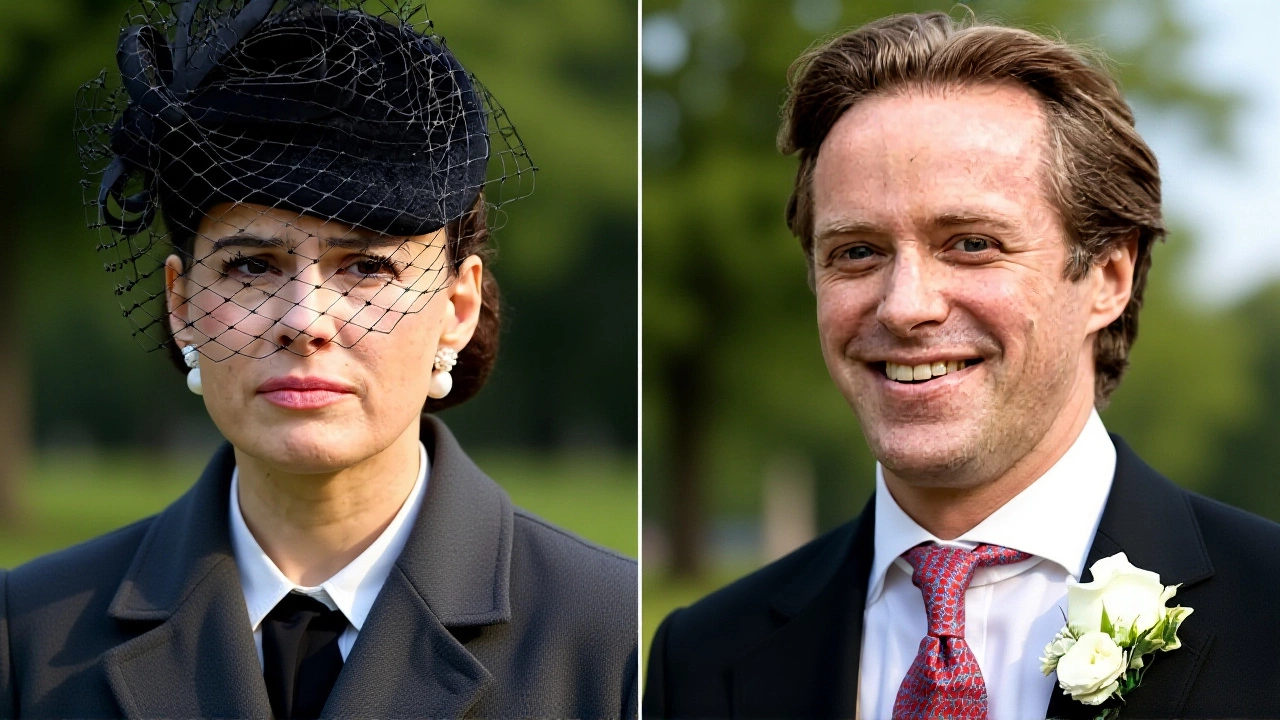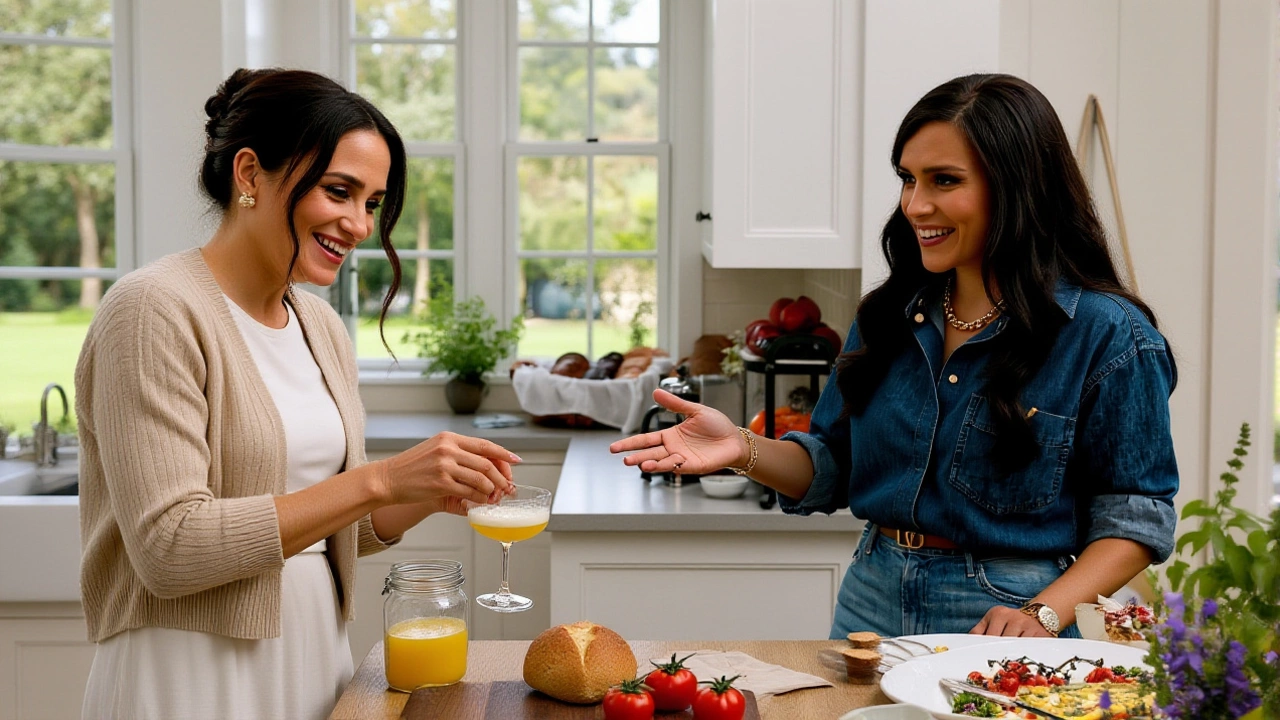Lady Frederick Windsor Calls Royal Life 'Total Hell' in Shocking 2024 Interview
 Nov, 16 2025
Nov, 16 2025
When Lady Frederick Windsor told The Times in 2024 that life inside the British monarchy is "total hell," she didn’t just drop a bombshell—she cracked open a door the royal family has spent decades trying to keep shut. The 45-year-old actress, born Sophie Elizabeth Winkleman in London, spoke with raw honesty about the psychological toll of being born into a life where fame isn’t chosen—it’s inherited. "None of them went on Pop Idol or something to be famous," she said. "To have that sort of blinding spotlight in your face from when you’re born... is just brutal."
The Weight of a Crown You Didn’t Ask For
Lady Frederick Windsor’s comments are especially jarring because they come from someone who was once an insider’s insider. In a 2020 interview, she praised Queen Elizabeth II, Prince Charles, and Prince William, calling them "wonderful" and "heaven." But after 15 years of marriage to Lord Frederick Windsor—the 54th in line to the throne and son of Prince Michael of Kent—her perspective has shifted dramatically. She now sees the monarchy not as a glittering institution, but as a gilded cage. Her description of "unasked-for fame" as "a form of torture" cuts deeper than surface-level criticism. It echoes the trauma described by Prince Harry and Meghan Markle in their 2023 memoir Spare, but with a crucial difference: Lady Frederick Windsor never left. She’s still attending royal events, still helping her daughters—Maud Windsor, 16, and Isabella Windsor, 13—prepare for ceremonial duties. She’s watched the system from the inside, and what she’s seen has broken her.A Life Between Two Worlds
Unlike working royals like Prince William or Catherine, Princess of Wales, Lady Frederick Windsor doesn’t represent the Crown officially. She’s a non-working royal, an actress who’s played roles in Peep Show, Two and a Half Men, and most recently, Wonka as The Countess. That duality gives her a rare vantage point: she’s close enough to feel the pressure, far enough to breathe. She’s seen how even the most well-intentioned royal engagements become media spectacles. How a simple walk to the church for a christening can be dissected for fashion choices, body language, even the angle of a smile. "You don’t know if someone’s going to betray you," she said. "People writing lies about you the whole time." It’s not paranoia—it’s the lived reality of every royal child. Her daughters, Maud and Isabella, have already served as bridesmaids at their aunt Lady Gabriella Windsor’s 2019 wedding at St James’s Palace. They’ve been photographed in tiny tiaras, their faces frozen in polite smiles. What does that do to a child? Lady Frederick Windsor doesn’t say. But the silence speaks volumes.
Parallel Traumas: Royals and the Digital Generation
The most surprising twist? Her 2024 critique didn’t come in isolation. That same year, she joined forces with actor Hugh Grant and psychologist Jonathan Haidt to campaign for strict limits on children’s smartphone and social media use. Haidt’s book, The Anxious Generation, argues that digital exposure is triggering a mental health crisis among teens. Lady Frederick Windsor drew a direct line between the two: "The constant scrutiny royals face from birth is the same as what kids face online—except they can’t turn it off. No mute button. No logout. No escape." It’s a chilling analogy. One system traps people in a physical spotlight; the other, in a digital one. Both are relentless. Both are inescapable. Both leave scars.What This Means for the Monarchy
Her remarks land at a fragile moment. King Charles III, 75, is trying to modernize the institution after the seismic shock of Meghan and Harry’s exit. Queen Camilla, 77, is navigating public skepticism. Prince William and Catherine, both 42, are under unprecedented pressure to appear relatable while maintaining dignity. Lady Frederick Windsor’s words aren’t just an indictment—they’re a warning. If even a well-integrated, non-working member of the family sees royal life as "not remotely healthy," what does that say about the future? Her daughters are growing up in a world where TikTok influencers have more control over their narratives than the royal family does. If Maud and Isabella ever feel the same way their mother does—will they choose to walk away? And if they do, what happens to the monarchy when the next generation refuses to play by the old rules?
Why This Isn’t Just About Royalty
This isn’t just a royal scandal. It’s a mirror. We live in an age where fame is commodified, privacy is extinct, and every child is being raised in a world of algorithmic surveillance. The royals didn’t invent this. But they’ve lived it longer than anyone. And now, one of their own is saying: "This isn’t a life. It’s a sentence."Frequently Asked Questions
How did Lady Frederick Windsor’s views on the monarchy change from 2020 to 2024?
In 2020, Lady Frederick Windsor praised Queen Elizabeth II, Prince Charles, and Prince William as "wonderful" and "heaven." By 2024, after 15 years of close observation within the royal family, she called royal life "total hell," citing unasked-for fame and relentless media scrutiny as psychologically destructive. Her shift reflects deepening awareness of the institution’s hidden toll, not a personal grievance.
Why is her perspective more credible than other royal critics?
Unlike Prince Harry or Meghan Markle, who left the institution, Lady Frederick Windsor remains embedded in royal circles. She attends events, her children participate in ceremonies, and she’s never publicly criticized individuals—only the system. Her status as a non-working royal gives her insider access without the pressure to perform, making her critique uniquely observant and unfiltered.
What impact could her comments have on the royal family’s public image?
Her remarks reinforce growing public concern about mental health in the monarchy, especially after the Spare memoir. While the Palace won’t respond officially, the timing—amid King Charles’s modernization efforts—makes her words hard to ignore. They add fuel to calls for greater privacy protections for young royals and may influence future reforms around media access.
How does her advocacy for limiting children’s tech use connect to her royal critique?
She draws a direct parallel: both royals and children today face inescapable public scrutiny. Royals are watched by paparazzi from birth; children are monitored by algorithms and social media. Her collaboration with Jonathan Haidt and Hugh Grant highlights how the monarchy’s trauma isn’t unique—it’s a preview of a broader societal crisis where privacy is eroded, and identity is commodified.
What roles have Lady Frederick Windsor’s daughters played in royal events?
Her daughters, Maud Windsor (16) and Isabella Windsor (13), served as bridesmaids at their aunt Lady Gabriella Windsor’s wedding to Thomas Brooksbank at St James’s Palace in May 2019. They’ve also appeared in public royal photos since childhood, often in formal attire, reinforcing their role as future participants in the institution—even if they never choose to take on official duties.
Is Lady Frederick Windsor still involved with the royal family today?
Yes. Despite her harsh critique, she continues to attend royal events, including Christmas at Sandringham and Trooping the Colour. She maintains her acting career but remains a visible part of the extended Windsor family. Her presence suggests she hasn’t severed ties—she’s simply chosen to speak out, perhaps hoping to change the system from within.